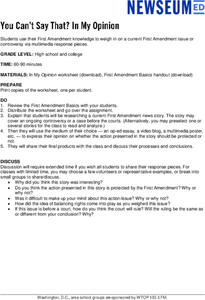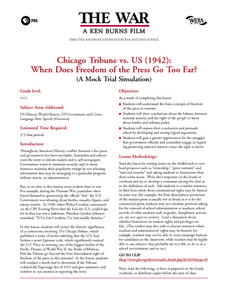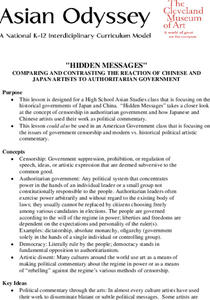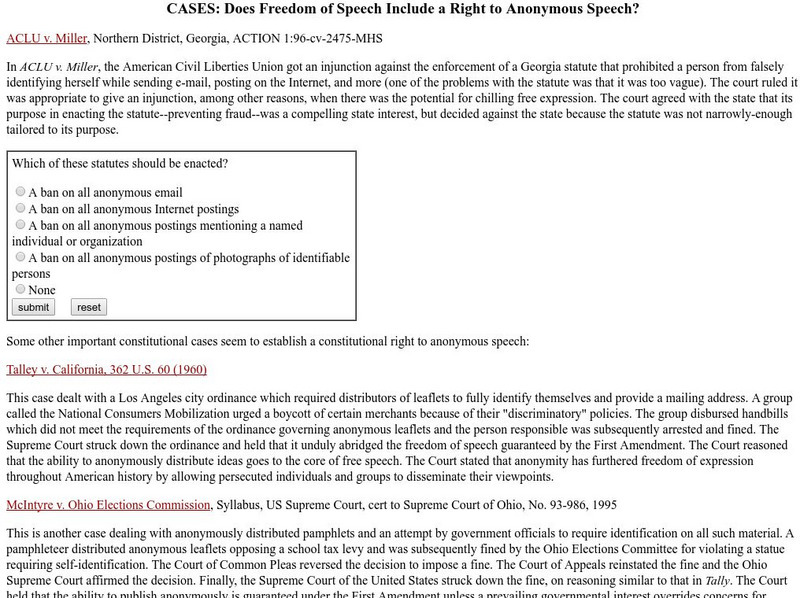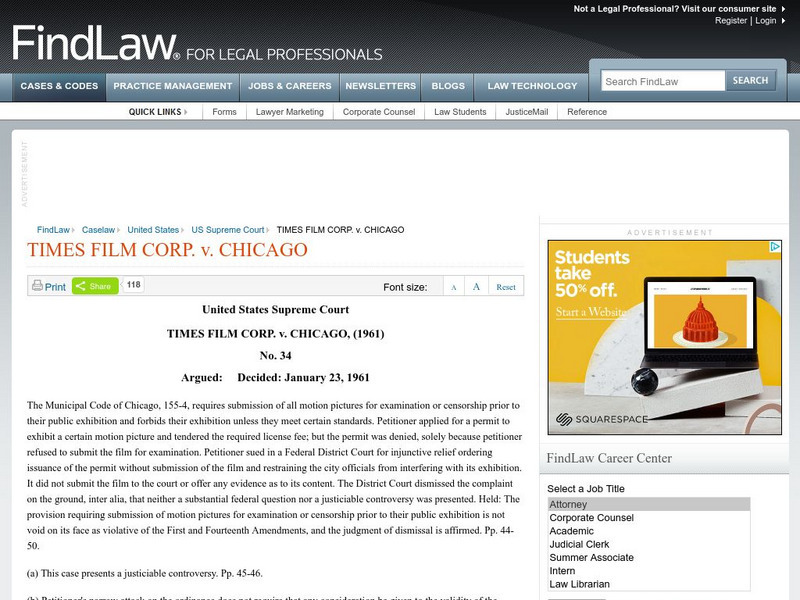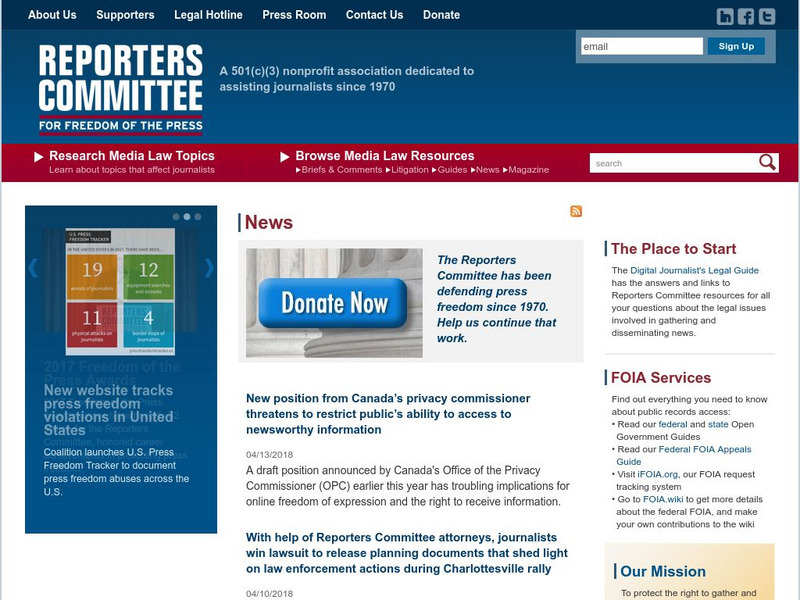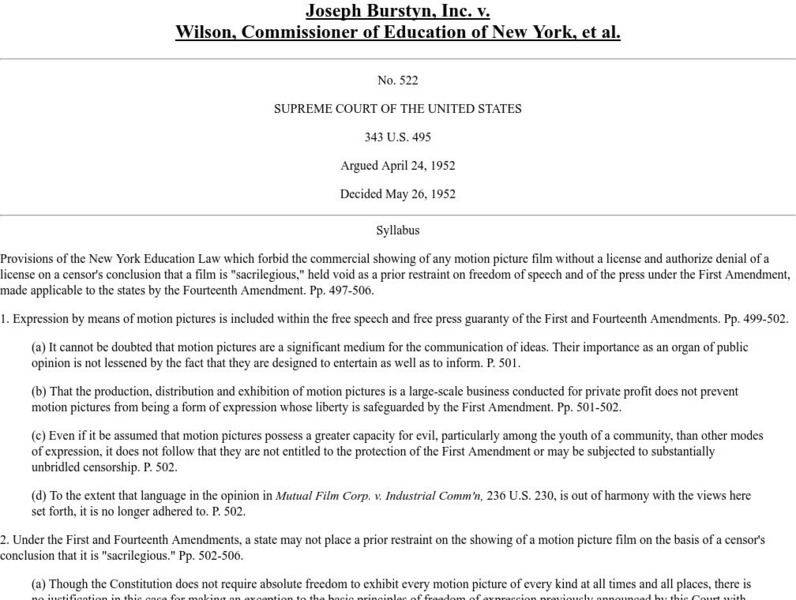K20 LEARN
Trigger Warnings - Intellectual Rights and Responsibilities: Banned Books, Censorship Part 1
"Warning: Conducting this lesson may be harmful." Such statements, called "Trigger Warnings," are the focus of a two-part lesson that looks at censorship, especially the pros and cons of trigger warnings. Class members read two articles,...
Curated OER
Rights And Responsibilities: Debating Free Speech, Responsibility And Censorship on Campus
Students weigh rights of students and others to free speech versus the responsibilities that come with those rights.
Administrative Office of the US Courts
Hazelwood v. Kuhlmeier
Freedom of speech is not always free. Scholars investigate how the First Amendment provides for the right to express opinions. Through the court case Hazelwood v. Kuhlmeier, they analyze free speech using primary documents—and hopefully...
K20 LEARN
To Ban or Not to Ban? Intellectual Rights and Responsibilities: Banned Books, Censorship Part 2
After examining different perspectives on book banning, scholars select a book from a list of frequently banned books and research the controversies surrounding it. They then craft an argument about their chosen book, including arguments...
Curated OER
Freedom of Hate Speech?
Learners, using a New York Times article as a springboard for discussion, investigate and debate the complex issues of First Amendments Rights and censorship for Hate Groups using Websites for propaganda.
Curated OER
Banned Book Week: Tips for Teaching Censorship
Consider how book censorship erodes our right to free speech and intellectual freedom.
Madison Public Schools
Journalism
Whether you are teaching a newspaper unit in language arts, covering the First Amendment and censorship in social studies, or focusing on writing ethics in journalism, a unit based on the foundations of journalism would be an excellent...
Newseum
You Can’t Say That: In My Opinion
As a part of a study of the First Amendment, high schoolers research a current news story that seems to involve one of the freedoms granted by the First Amendment. Investigators decide whether they think the action presented in the story...
Curated OER
Pornography Debate
Present your seniors with a controversial topic while studying the first amendment: pornography. This multi-layer resource has scholars writing a pros and cons research paper. They also attend a city council meeting to prepare for an...
Curated OER
Chicago Tribune vs. US (1942): When Does Freedom of the Press Go Too Far?
High schoolers define freedom of the press in peace and war time. As a class, they identify the need for the public to be informed, but discuss where the line should be drawn to protect national security. They develop their arguments...
Curated OER
Keeping It Quiet
Students consider ways in which countries use censorship to control information. They examine China's recent abridgement of a politician's speech and consider China's recent history with other nations to better explain why censorship is...
Curated OER
Cold War Era Film Censorship: High Noon- a Slice of Americana Or Communist
Students study of the effects of the Cold War on the home front. They analyze the film High Noon according to an abbreviated version of the standards that films were judged by in the early 1950s and determine whether or not High Noon is...
Curated OER
Lesson Plan for Reading
Students in an adult ESL classroom are introduced to the definition of freedom of speech. Using the internet, they discover the differences between the rule of law and rule of men. To end the lesson, they examine how the court system...
Curated OER
Why Burn Books?
Students identify the role of free speech in the selection of library books. They choose one banned book to read and evaluate the reason for its censorship. They create an argument for or against the selection of the book.
Curated OER
Marie Antoinette and the French Revolution
Young scholars examine how the French and American revolutions influenced and emergence of free press in these countries. Students explore the link between government control of the press and the type of government. They compare and...
Curated OER
Hidden Messages
Students examine the concept of censorship in authoritarian government and how Japanese and Chinese artists used their work as political commentary. This lesson includes possible lesson enrichments.
Harvard University
Harvard Law: Freedom of Speech and Anonymous Speech
This site from Cyber Harvard Law offers summaries of three different Supreme Court cases which address the limits of free speech. Includes interactive opinion, multiple-choice questions. Links to the written opinions of the Court for...
Penguin Publishing
Penguin Random House: "Censorship: An Educator's Guide"
Activities, writing prompts, points of discussion and some additional resources are offered here to help with teaching about free speech and censorship.
Thomson Reuters
Find Law: u.s. Supreme Court: Times Film Corp. V. City of Chicago (1961)
Read the majority opinion of the U.S. Supreme Court in Times Film Corp. v. City of Chicago, a 1961 case that focused on free speech and obscenity.
Other
Article 19: Promoting Freedom of Expression
Discusses right to information and freedom of expression issues. Bright, colorful, nicely designed with many resources.
Reporters Committee for Freedom of the Press
Rcfp: The Reporters Committee for Freedom of the Press
This non-profit organization collects instances of First Amendment and Freedom of Information cases throughout the United States and reports on the facts and outcomes. An interesting cross section from this section of our law.
Thomson Reuters
Find Law: u.s. Supreme Court: Joseph Burstyn, Inc. V. Wilson (1952)
This resource provides information about the Joseph Burstyn v. Wilson Supreme Court case.
Boston College
Boston College: Joseph Burstyn, Inc. V. Wilson (1952)
Full-text edition of the entire decision in the Joseph Burstyn, Inc. v. Wilson case.
Other
A Guide to Hazelwood School District v. Kuhlmeier
This site has A Complete Guide to the Supreme Court Decision for this Supreme Court case. It can be downloaded as a PDF file. The article explains many different aspects of the case, including What the Decision Says, What the Decision...









